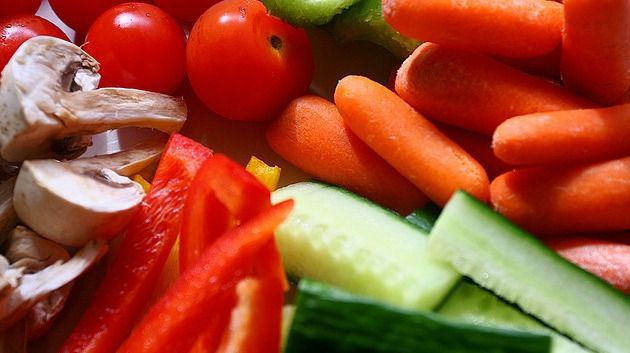Could That Steak Be Killing You? Vegetarian Diets Proven To Increase Life Expectancy

Could vegetarianism be more than a fad diet?
A study published by Vegetarian Times shows that 3.2 percent of Americans, or about 7 million people, follow vegetarianism, and 5.2 percent are interested in starting a vegetarian diet.
While vegetarianism, and its many incarnations like veganism, have been around for centuries, the diet and lifestyle have now been proven to increase the lifespan of those who follow it.
In previous studies, vegetarianism has been shown to reduce the risk of chronic diseases like diabetes mellitus, osteoporosis, rheumatoid arthritis, dementia, hypertension, and forms of heart disease. These benefits arise from the diet's lack of saturated fats, cholesterol, and hard-to-digest animal proteins. Well-balanced vegetarian diets also afford people greater intake of complex carbohydrates, which are burned off quickly and easily, along with vitamins and fiber.
Accordingly, the argument that vegetarianism makes room for many dietary deficiencies is a misunderstanding. In 2005, researchers at the Insititute of Nutritional Sciences in Germany indicated that dietary deficiencies common among vegetarians, like a lack of iron, calcium, or certain vitamins, are actually a result of poor planning on the part of these individuals. While it may difficult to plan a meal effectively, vegetarian and vegan options do exist in great variety.
In a study of 73,308 Seventh Day Adventists, a creed that promotes somewhat strict dietary rules for its congregates, researchers found that a vegetarian diet and its benefits can reduce a person's "hazard ratio", or likelihood of developing a lethal disease, by 12 percent. Twelve percent may sound meager, but these people, who followed different forms of vegetarian diets - including pesco-vegetarian, meaning they still eat seafood, lacto-vegetarian, meaning they still include dairy and eggs in their diets, as well as vegan, meaning there are no animal products in their diet - still had a higher life expectancy than non-vegetarians.
Of the cohort, 2,570 people died over the span of the five-year study; the death rate among the non-vegetarians was significantly higher than each of the individual vegetarian groups. While many people in the cohort died of heart disease, the majority of them were non-vegetarian. The diet as a whole has been found to decrease likelihood of obesity and hypertension in all of those studied.
The benefits of vegetarian eating appear to promote health for the body, including prevention of serious diseases. In women, vegetarianism decreases risk for female-specific and gastrointestinal cancers. In men, the diet helps with cardiovascular health and prevents other noncancerous diseases like diabetes and renal dysfunctions.
Registered dietician Glenn King, Ph.D., explains that the high fat and protein content of meat forces the body to take more time to digest it. This time spent forces the body to work overtime to digest, leaving less time for normal maintenance, like the immune system's check for cancer cells or the beginnings of an ailment in order to alert the body and try to fix itself. This excess time spent in the digestive tract due to meat also causes digestive upsets like constipation, which can lead to other illnesses like high blood pressure and colon injuries.
Vegetables, and other foods eaten by vegetarians, are simple in terms of their chemical make-up and are easily digested, allowing vegetarians greater health benefits.
The researchers from this most recent study have said that given this new evidence regarding vegetarianism, vegetarian diets should be considered by doctors offering dietary guidance to those at risk of developing life-threatening diseases.
Source: Orlich MJ, Singh PN, Sabate J, et al. Vegetarian Dietary Patterns and Mortality in Adventist Health Study 2. JAMA Intern Medicine. 2013
Published by Medicaldaily.com



























